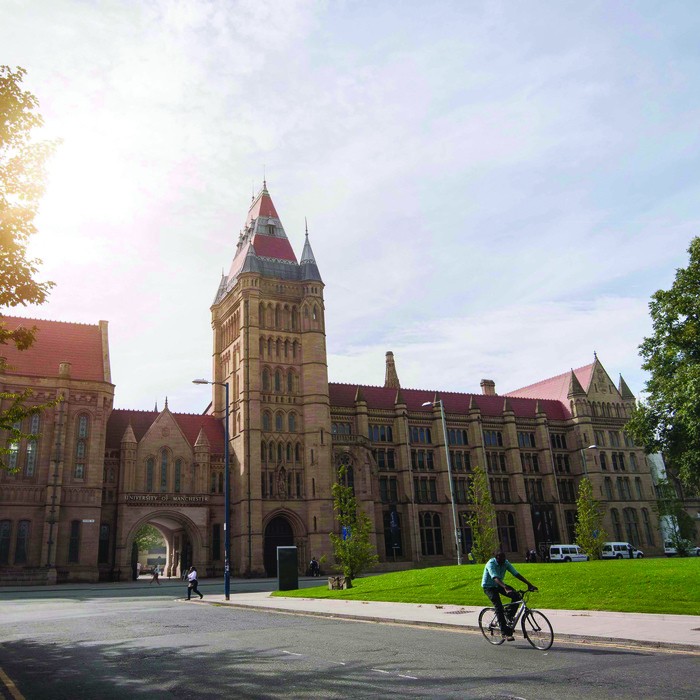University announces partnership with AVROBIO for Hunter syndrome gene therapy
The University of 优蜜传媒 has announced today a groundbreaking gene therapy partnership to ease the lifelong suffering of people with Hunter syndrome.
The University has agreed to a worldwide license and collaborative research funding agreement with ., a leading clinical-stage gene therapy company with a mission to free people from a lifetime of genetic disease, based in Cambridge, Massachusetts, USA.
The significant partnership agreement is for the clinical development of an investigational lentiviral gene therapy for mucopolysaccharidosis type II (MPS II), or Hunter syndrome, a rare and deadly lysosomal disorder that primarily affects young boys.
Hunter syndrome, which affects an estimated , causes devastating complications throughout the body and brain, including severe cardiac and respiratory dysfunction, skeletal malformations and hearing impairment. Children with severe cases of Hunter syndrome typically show early symptoms in their toddler years and begin to regress developmentally around age six, losing basic motor skills and cognitive function.
The current standard of care is weekly enzyme replacement therapy (ERT), which can delay some complications but does not halt overall progression of the disease and has not been demonstrated to address cognitive issues. Even with ERT, people with Hunter syndrome face life-limiting symptoms and a significantly reduced life span.
The University of 优蜜传媒 will sponsor the investigator-led Phase 1-2 clinical trial for Hunter syndrome which is expected to begin in 2021. The Hunter syndrome program was developed by Brian Bigger, a professor of cell and gene therapy at The University of 优蜜传媒. Professor Bigger has published preclinical data demonstrating that the introduction of the transgene with an optimised, proprietary tag has the ability to correct peripheral disease and normalise brain pathology.
We feel an enormous urgency to bring forward a treatment that may halt this deadly disease in its tracks, before symptoms emerge and before children lose their physical and cognitive skills. We are delighted to be working with AVROBIO on this program.
Primary investigators for the clinical trial will be; Professor Robert Wynn, Consultant Paediatric Hematologist at the and Dr. Simon Jones, Consultant Paediatric Physician for inherited metabolic diseases at the Willink Unit, and the .
“We feel an enormous urgency to bring forward a treatment that may halt this deadly disease in its tracks, before symptoms emerge and before children lose their physical and cognitive skills,” said Professor Bigger. “We are delighted to be working with AVROBIO on this program. Both of our teams have deep experience running international clinical trials in other lysosomal disorders. AVROBIO also has a leading gene therapy platform, plato®, which is designed to optimise the consistency, predictability and efficacy of its gene therapies and to enable efficient scaling for worldwide commercialization. By working together, we believe we can greatly accelerate development of this important program.”
The investigational gene therapy, which will be called AVR-RD-05, involves ex vivo transduction of the patient’s own hematopoietic stem cells with a therapeutic transgene designed to express functional enzyme the patient needs to maintain cellular health, coupled to a proprietary protein tag that is designed to improve stability of the enzyme in the bloodstream and facilitate uptake by tissues from head to toe. When reinfused into the patient, the gene-modified stem cells are expected to engraft in the bone marrow and produce generations of daughter cells, each carrying the transgene. Those daughter cells are then expected to differentiate into macrophages, microglia and other components of the immune system and circulate throughout the body and central nervous system, potentially enabling widespread distribution of functional enzyme.
Geoff MacKay, AVROBIO’s president and CEO said: “The lentiviral gene therapy approach is well suited to treat a progressive and pervasive disease such as Hunter syndrome, which affects organs throughout the body and severely impairs cognitive function. If we treat children early, before their symptoms arise, we hope to prevent the tragic complications that rob these young children of their futures.
“We believe our deep experience with investigational gene therapies for lysosomal disorders will enable us to efficiently move the program through clinical development in collaboration with Professor Brian Bigger, who has done tremendous work to develop and optimize this investigational gene therapy. We’re proud to add this program to our leading lysosomal disorder pipeline and excited about its potential to change the lives of patients and families living with Hunter syndrome.”
The University of 优蜜传媒’s technology transfer office, The and AVROBIO have negotiated the exclusive, worldwide license to the technology. Under the terms of the license, AVROBIO will pay The University of 优蜜传媒 an upfront cash payment and additional payments based on the achievement of development and regulatory milestones. The company will pay The University a mid-single digit percentage royalty on annual net sales of licensed products. Additionally, under the collaborative research funding agreement, AVROBIO will cover budgeted clinical trial costs.
Andrew Wilkinson, CEO of the University’s technology transfer company, The University of 优蜜传媒 Innovation Factory said: “We are delighted that AVROBIO will be working with teams from The University of 优蜜传媒 and The University of 优蜜传媒 Foundation Trust to develop a therapy for this debilitating genetic disease. AVROBIO’s strategic focus on bringing new personalised gene therapies to the world along with their technical and commercial expertise in this area make them an excellent partner for the investigational Hunter syndrome gene therapy programme.”
